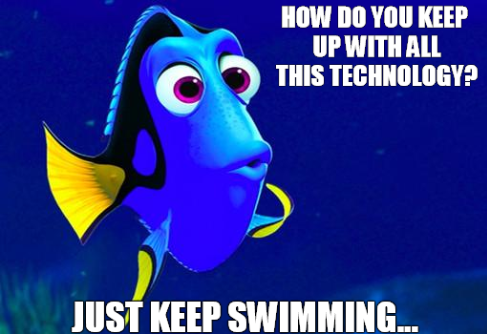 |
| Source |
There has been an ongoing shift in the educational system in connection with the way we as educators are expected to teach, the way our students are expected to learn and the standards to which we expect them to perform. As Sarah Meltzer (2013) suggests, schools are being targeted and challenged to respond to a technology-based world. This in turn means that expectations of the teacher have significantly increased if we want our students to be fully engaged in meaningful lessons. When it comes to professional development as it relates to technology integration in schools, we must look at it through a different approach.“Providing effective and sustainable professional development in technology to a group of teachers requires a very different approach”(Meltzer, 2013). Taking a one-day workshop on how to use a new software program will simply not cut it. Technology integration is a process, therefore the professional development aspect is as well.
In terms of pedagogy and technology integration, it is pivotal that the classroom teacher is included in the discussion of what will take place in the classroom. This is not subject matter that can be solely left up to administration. Simply put, if a teacher is not comfortable in their own ability to use the technology, how could we ever expect them to teach/use it effectively with the students? To help solve this issue “it is important that educators perceive technology in education as part of the pedagogical process” (Okajie, Olinzock, & Okokjie-Boulder, 2006). Technology by no means is a replacement of the teacher but rather a tool to help the teacher captivate the student. As Adam Bellow (2012) mentions in the short video An Introduction to Technology Integration, it's what you do with that tool, what you can make, what you allow the students to make.
 |
| Source |
Of course with every change will come the challenges and as a technology integration specialist there are many. One major factor is time. It takes time to integrate technology into a curriculum and it takes time to move a school forward with a technology-based mindset. There must be a clear goal in place as to what direction the school is moving toward and where they expect themselves to be in a 3-months, 6-months or up to a year from the initial proposal. Also, a technology integration specialist cannot succeed this on their own. They must have the support of administration, faculty and the school community. A study by Hew and Brush in 2006 found six general barriers when integrating technology into K-12 schools. The most frequent barrier was found to be lack of resources/technology. This includes factors such as hardware, software, internet access and specialists. The second most occurring barrier was lack of knowledge on technology. Again, this brings up the issue and importance of professional development for teachers. The next barrier was insufficient access to technology, meaning that technology was not easily accessible for teachers or students. For instance, a school with one one computer lab may often find teachers competing to get in there. Then there is the barrier of teacher attitude and beliefs. If a teacher finds that technology serves no purpose in the classroom then they will simply not integrate it into their instructional time. Assessment is also a major barrier frequently brought up in relation to technology integration. Some argue that with so much pressure and demand to “teach to the test” there is simply no time to put forth in technology integration. Finally, the last barrier Hew and Brush focus on is subject culture. This barrier involved educators picking and choosing what they feel is appropriate for their content-area.
References
Conley, L. (2010). Barriers to integrating technology. The Digital Librarian.
Retrieved from https://sites.google.com/site/thedigitallibrarian/barriers-to-integrating-technology
Fink, Z. (December 12, 2012). An introduction to technology integration. [Video file]. Retrieved from http://www.edutopia.org/technology-integration-introduction-video
Meltzer, S. (2013). Step-by-step professional development in technology. London, ENG: Routledge.
Okojie, M., Olinzock, A., & Okajie-Boulder, T. (2006). The pedagogy of technology integration. Journal of Technology Studies, 32, 66-71.
Brittany, you bring up many good points! It is definitely critical that we have effective and sustainable professional development in regards to technology. Plus, with technology changing so frequently, teachers need to be up to date on the latest technology and therefore training needs to happen on a regular basis. Not only does it change frequently, but there are so many programs and other tools out there, that the technology use could vary between districts. So any new teachers in the district would need to get up to speed. I think teachers should be learning about technology tools throughout the year, including hands-on training as well.
ReplyDelete"Simply put, if a teacher is not comfortable in their own ability to use the technology, how could we ever expect them to teach/use it effectively with the students?"
ReplyDeleteVery true. We expect content knowledge mastery of our teachers, as well as pedagogical knowledge. But the "T" in T-PACK doesn't always get the same treatment. Once teachers are solid in their understanding of tech integration, they are able to achieve that T-PACK balance.